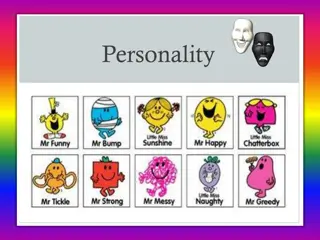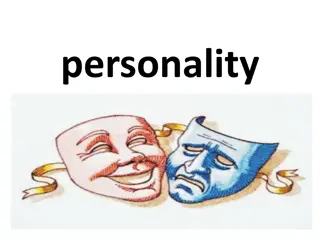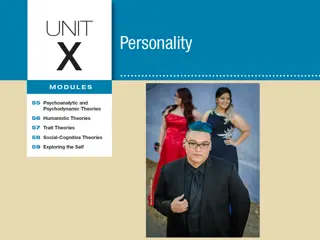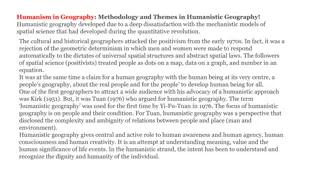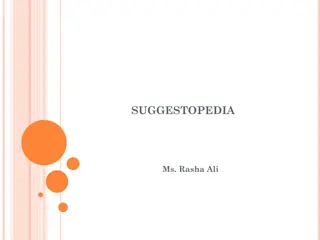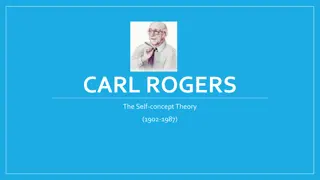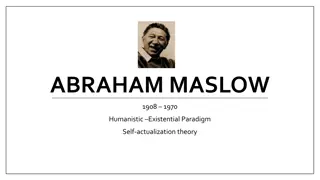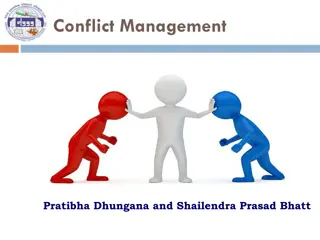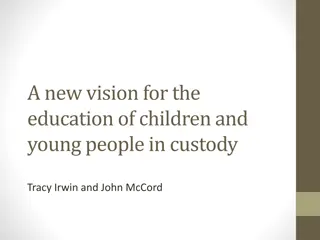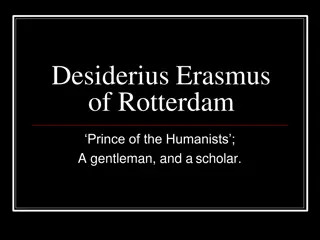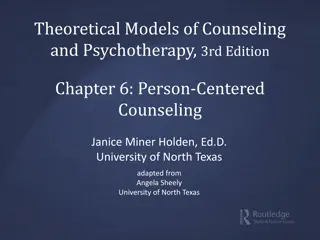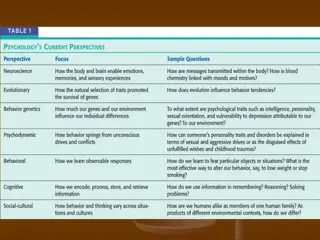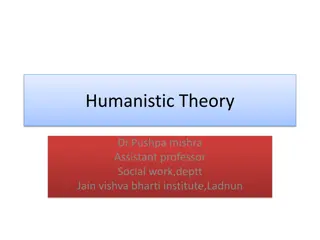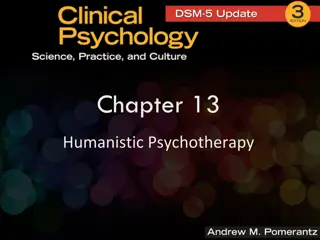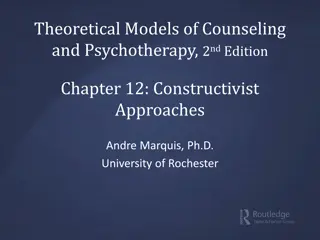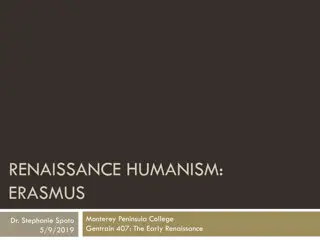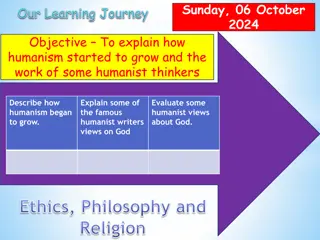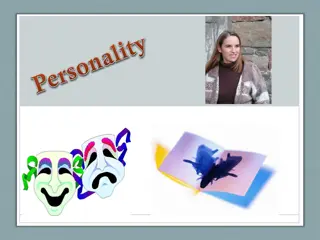Outcomes Research
Explore the definition and importance of outcomes research in managed care, including the tools used to measure clinical, economic, and humanistic outcomes. Discover the role of managed care pharmacists in outcomes research.
3 views • 20 slides
Ginzburg Landau phenomenological Theory
The Ginzburg-Landau phenomenological theory explains superconductivity and superfluidity as distinct thermodynamic phases. It focuses on phase transitions characterized by singularities in specific heat at the transition temperature. Derived from BCS theory, it quantifies condensation energy, emphas
1 views • 38 slides
Understanding Personality: Theories, Types, and Assessment
Exploring the intricate world of personality, this comprehensive guide delves into major theories of personality development, assessment methods, cultural influences, and key contributors. Discover the different types of personalities, including Type A and Type B, and unravel the complexities of psy
1 views • 96 slides
Evolution of Mathematical Theories and Proof Systems
Development of mathematical theories such as model theory, proof theory, set theory, recursion theory, and computational complexity is discussed, starting from historical perspectives with Dedekind and Peano to Godel's theorems, recursion theory's golden age in the 1930s, and advancements in proof t
1 views • 29 slides
Understanding Personality: Theories and Components Explained
Personality is the unique and enduring characteristics that define individuals, influencing their behavior consistently over time. Explore the origins of personality from the Latin word 'persona' meaning 'mask', and delve into major perspectives such as psychoanalytic, trait, humanistic, and social-
1 views • 45 slides
Understanding Maslow's Hierarchy of Needs in Humanistic Psychology
Humanistic psychologists, such as Abraham Maslow and Carl Rogers, viewed personality as a quest for self-determination and self-realization. Maslow's hierarchy of needs illustrates how individuals progress from fulfilling basic physiological needs to achieving self-actualization and self-transcenden
0 views • 25 slides
Psychological Theories of Criminality: Understanding the Roots
Psychological theories of criminality delve into the association between intelligence, personality, learning, and criminal behavior. Major theories include Psychodynamic Theory by Freud, Behavioral Theory by Bandura, and Cognitive Theory by Kohlberg. These theories explore how unconscious mental pro
1 views • 20 slides
Understanding the Theory of Firms: Neoclassical vs. Modern Approaches
The theory of firms is explored through the Neoclassical and Modern perspectives. Neoclassical theory focuses on profit maximization, while Modern theory delves into managerial, principal-agent, and transaction cost theories. The discussion covers criticisms of Neoclassical theory and the essential
1 views • 79 slides
Humanism in Geography: Methodology and Themes
Humanistic geography emerged as a critique of mechanistic spatial models during the quantitative revolution, emphasizing human agency, consciousness, and creativity in understanding the complexities of human-place relationships. It rejects geometric determinism and celebrates individual dignity, pro
0 views • 4 slides
Understanding Suggestopedia: A Humanistic Approach to Language Learning
Suggestopedia, an affective-humanistic approach to language learning, aims to eliminate negative feelings towards studying and boost students' confidence. By incorporating elements like posters, encouraging interactions, music, and student participation, this method emphasizes the teacher's authorit
0 views • 9 slides
Theories of Causation in Psychological and Social Sciences
Overview of theories of causation categorized into psychological, social psychological, and sociological perspectives. Psychological theories focus on instinctive, biological, and psychological qualities of abusers, including Attachment Theory, Psychodynamic Theory, Social Learning Theory, and Situa
0 views • 15 slides
Carl Rogers and the Self-Concept Theory
Carl Rogers, a prominent figure in personality theory, emphasized individuals' constructive potential and the impact of their subjective experiences on personality development. He viewed individuals as goal-directed and capable of change, with the environment playing a facilitating or inhibiting rol
1 views • 78 slides
Understanding Abraham Maslow's Humanistic Existential Paradigm
Explore the key concepts of Abraham Maslow's humanistic existential paradigm, including self-actualization theory, perspective, and views on need gratification. Learn about Maslow's belief in human potential, the motive for self-actualization, and the importance of need gratification in realizing in
1 views • 81 slides
Understanding Political Theory through a Contextual Approach
Exploring G.H. Sabine's perspective on political theory through a contextual approach, emphasizing the importance of historical context and societal influences. Sabine argues that while political theory evolves with its contemporary politics, it should be analyzed within its specific time and social
0 views • 9 slides
Evolution of Light Theory: From Wave Theory to Quantum Theory
At the turn of the century, the discovery of the photoelectric effect challenged the wave theory of light, leading to the development of the quantum theory by Max Planck and Albert Einstein. This new theory introduced the concept of discrete energy units known as quanta, bridging the gap between wav
1 views • 62 slides
Understanding Conflict Management: Key Perspectives and Approaches
Explore the multifaceted realm of conflict management through the lenses of traditional, humanistic, and interactionistic views. Delve into the definition, nature, and implications of conflict, and assess varying opinions on confrontation, communication, and resolution strategies within organization
1 views • 31 slides
Unveiling Positive Psychology: Shifting Focus from Weakness to Strength
Delve into the evolution and principles of positive psychology, which emerged as a reaction to traditional approaches focusing on weaknesses. Learn about its roots in humanistic psychology, and the shift towards a more holistic and strengths-based perspective. Explore how positive psychology advocat
7 views • 19 slides
Dp-branes, NS5-branes, U-duality, and M-Theory Overview
Overview of Dp-branes, NS5-branes, and U-duality derived from nonabelian (2,0) theory with Lie 3-algebra. Introduction to M-theory, including M2-branes and M5-branes in the strong coupling limit. Discussion on BLG theory, Lorentzian Lie 3-algebra, and the ABJM theory for M2-branes.
1 views • 32 slides
Understanding Time-Independent Perturbation Theory in Quantum Mechanics
Perturbation theory is a powerful tool in solving complex physical and mathematical problems approximately by adjusting solutions from a related problem with known solutions. This theory allows for more accurate approximate solutions by treating the difference as a small perturbation. An example inv
0 views • 19 slides
Transforming Education for Young People in Custody: A New Vision
Rethinking the traditional prison education system for young people in custody, Tracy Irwin and John McCord propose a humanistic approach with self-directed and experiential learning to address literacy challenges, mental health issues, and negative learning identities. The new vision includes offen
0 views • 11 slides
Life and Legacy of Desiderius Erasmus of Rotterdam
Desiderius Erasmus, a Dutch philosopher and scholar, was a pivotal figure in the humanist movement of the Renaissance. Born in Rotterdam in 1460, Erasmus advocated for unrestricted learning, church reform, and intellectual independence. His works, such as "In Praise of Folly," left a lasting impact
0 views • 7 slides
Ethical Theories: Divine Command vs. Virtue Theory Explained
Divine Command Theory asserts that morality is derived from God's commands, contrasting with Virtue Theory which focuses on developing moral virtues to achieve human flourishing and excellence. Divine Command Theory relies on religious texts, while Virtue Theory emphasizes the cultivation of virtues
0 views • 24 slides
Person-Centered Counseling: A Historical and Philosophical Overview
Person-Centered Counseling, pioneered by Carl Rogers, is grounded in humanistic principles such as actualizing tendency, awareness, and existential concepts. This approach emphasizes the innate potential for growth and self-actualization within individuals, focusing on creating a supportive and nonj
0 views • 20 slides
Understanding Fermi Liquid Theory in Interacting Fermion Systems
Fermi liquid theory, also known as Landau-Fermi liquid theory, is a theoretical model that describes the normal state of metals at low temperatures. Introduced by Landau and further developed by Abrikosov and Khalatnikov, this theory explains the similarities and differences between interacting ferm
0 views • 23 slides
Unveiling the Renaissance: A Journey of Rebirth and Humanism
Explore the transformative era of the Renaissance, a period of rebirth, flourishing art, literature, and humanistic revival after the dark Middle Ages. Discover how individuals embraced humanism, literacy thrived with the printing press invention, and the beauty of classical works was rekindled, sha
0 views • 11 slides
Computational Learning Theory: An Overview
Computational Learning Theory explores inductive learning algorithms that generate hypotheses from training sets, emphasizing the uncertainty of generalization. The theory introduces probabilities to measure correctness and certainty, addressing challenges in learning hidden concepts. Through exampl
0 views • 43 slides
Automata Theory and Theory of Computation Overview
This course overview covers concepts in automata theory and theory of computation, including formal language classes, grammars, recognizers, theorems in automata theory, decidability, and intractability of computational problems. The Chomsky hierarchy, interplay between computing components, modern-
0 views • 42 slides
Theories of Interest in Microeconomics II
Explore various theories of interest in economics, including the Classical Theory, Liquidity Preference Theory by Keynes, Productivity Theory, Abstinence Theory, Time-Preference Theory, Fisher's Time Preference Theory, and the Loanable Fund Theory. These theories offer different perspectives on the
0 views • 6 slides
Exploring the Evolution of Atomic Theory
Delve into the historical journey of atomic theory starting from Democritus and Aristotle's views to modern advancements proving some aspects of Dalton's theory incorrect. Learn about key laws and theories such as the Particle Theory of Matter, Dalton's Atomic Theory, and JJ Thomson's discoveries, s
0 views • 30 slides
Understanding the 7 Approaches in Psychology: Applied in the Case of Andrea Yates
Explore how the 7 psychological approaches - psychological, cognitive, behavioral, humanistic, biological, sociocultural, and evolutionary - can help analyze the complex case of Andrea Yates, who tragically murdered her children, delving into factors like postpartum depression, brain chemistry, fami
0 views • 12 slides
The Life and Works of Edmund Spenser (1552-1599)
Edmund Spenser, born in London around 1552, was a prominent English poet known for works such as "The Faerie Queene" and "The Shepheardes Calender." His contributions to English literature reflected religious, humanistic, and nationalistic ideals. Despite facing personal challenges, Spenser's poetic
0 views • 13 slides
Understanding Humanistic Theory of Personality and its Key Concepts
Humanistic theory emphasizes the active role individuals play in their behavior, with proponents like Abraham Maslow and Carl Rogers. It focuses on humanistic psychology, existentialism, and humanism, emphasizing personal meaning and values. The theory argues for the innate goodness of individuals a
0 views • 8 slides
Understanding Humanistic Psychotherapy: Core Concepts and Goals
Humanistic psychotherapy, led by figures like Carl Rogers and Abraham Maslow, emphasizes self-actualization and positive regard in therapy. The goal is to foster natural growth and wellness by promoting congruence between real and ideal selves. Essential therapeutic conditions include empathy, uncon
0 views • 15 slides
Constructivist Approaches in Counseling and Psychotherapy: A Philosophical Perspective
Constructivist approaches in counseling and psychotherapy emphasize the ongoing process of structuring experiences to create meaning. This perspective involves philosophical underpinnings from thinkers such as the Buddha, Immanuel Kant, and Jean Piaget, highlighting the role of individual constructi
0 views • 35 slides
Erasmus: Prince of Humanism and Renaissance Scholar
Explore the life and contributions of Erasmus, a prominent Christian humanist of the Northern Renaissance. Known for his scholarly works, Erasmus played a vital role in the revival of classical learning and the development of humanistic thought in Europe. His translations and philosophical reflectio
0 views • 12 slides
The Growth of Humanism: From Renaissance to Enlightenment
Humanism began to flourish during the Renaissance and the Enlightenment periods, challenging traditional religious beliefs and emphasizing the value of human reason, rights, and autonomy. Influential humanist thinkers questioned the authority of the Church, valued human creativity, and promoted indi
0 views • 26 slides
Rhetorical Approach to Translation Studies: Challenges and Perspectives
This study explores the emergence of a rhetorical approach in Translation Studies, aiming to counter empiricism and highlight the importance of subjectivity and interpretation in translation. By examining paradigms in Translation Studies, it contrasts the scientistic drive for objectivity with a hum
0 views • 34 slides
Understanding Personality: Theories and Perspectives
Personality is a dynamic psychological concept shaped by internal needs, cognitive processes, and external influences. Psychodynamic and humanistic theories offer insights into different aspects of personality, while clinical and social-cognitive perspectives contribute to our understanding. Freud's
0 views • 26 slides
Macromechanical Analysis of Lamina and Tsai-Hill Failure Theory Overview
The Tsai-Hill failure theory is based on the strengths of a unidirectional lamina, incorporating longitudinal and transverse tensile and compressive strengths, as well as in-plane shear strength. This theory, derived from the distortion energy theory, provides criteria for determining lamina failure
0 views • 15 slides
Standing Strong in a Humanistic World
In Philippians chapter three, Paul warns against placing confidence in worldly achievements and emphasizes the importance of knowing Christ. He exhorts believers to focus on their citizenship in heaven and eagerly await the transformation by Jesus Christ. The prevailing humanistic narrative of socie
0 views • 46 slides


